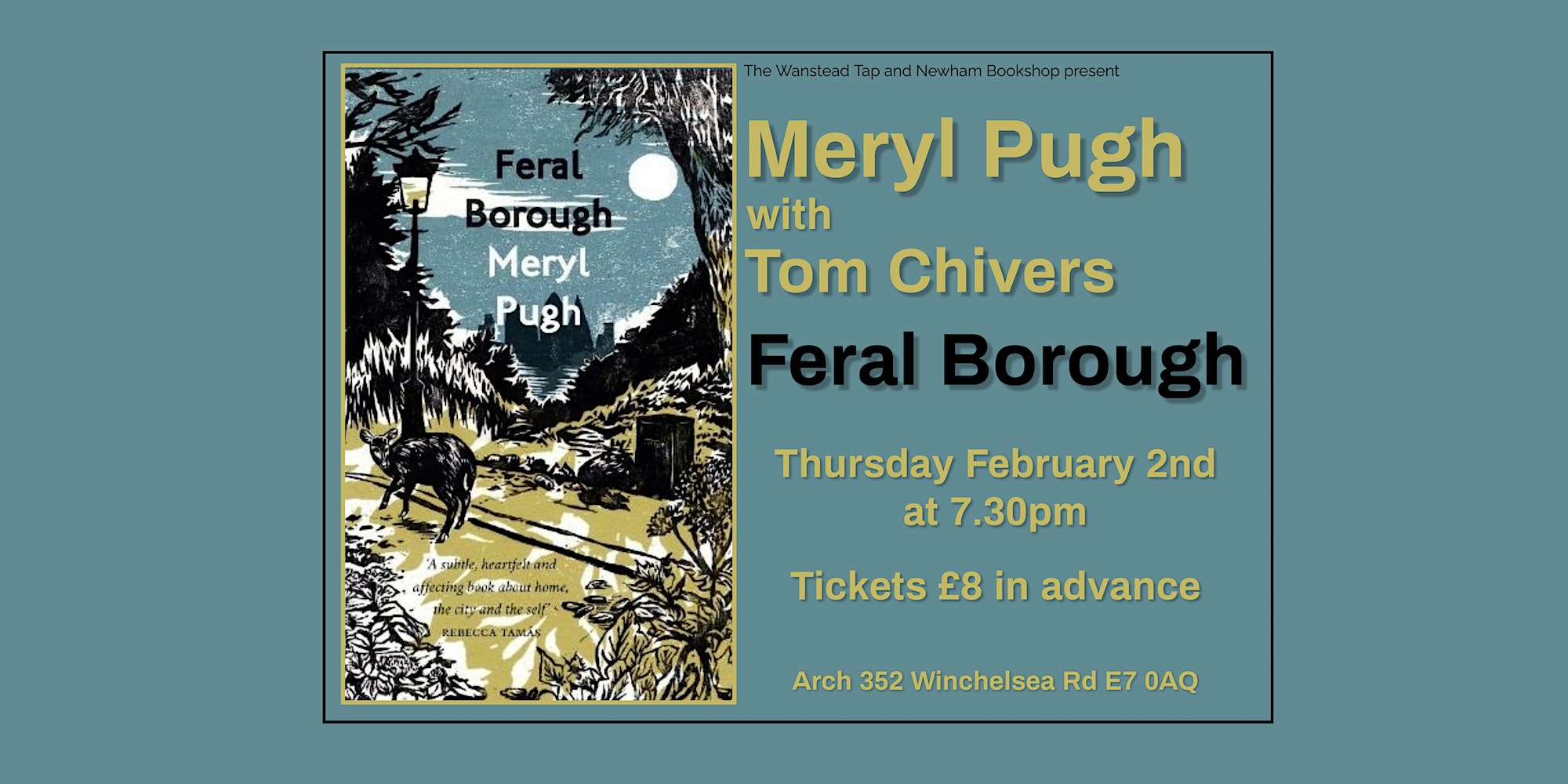

Meryl Pugh: Feral Borough
Join Meryl Pugh and Tom Chivers for a brilliant evening as they discuss her lates work “Feral Borough”.
Set in the urban pastoral of an East London postcode, Feral Borough asks what it means to call a place home, and how best to share that home with its non-human inhabitants.
Meryl Pugh reimagines the wild as ‘feral’, recording the fauna and flora of Leytonstone in prose as incisive as it is lyrical. Here, on the edge of the city, red kite and parakeets thrive alongside bluebell and yarrow, a muntjac deer is glimpsed in the undergrowth, and an escaped boa constrictor appears on the High Road.
In this subtle, captivating book – part herbarium, part bestiary and part memoir – Pugh explores the effects of loss, and lockdown, on human well-being, conjuring the local urban environment as a site for healing and connection.
A subtle, heartfelt and affecting book about home, the city and the self – Pugh reminds us that nowhere, however urban, is without nature; that wherever we go, the intricate web of life continues to shape and change us.
Rebecca Tamás, author of WITCH and Strangers
An intimate journey into places that are at once familiar and strange, known and unfathomable, Meryl Pugh’s writing conjures a wild city full of wonder among the everyday, and urges us to find that wonder for ourselves from our own doorsteps.
Kerri Andrews. author of Wanderers: a History of Women Walking
This is a most democratic bestiary. Skylarks and buzzards enjoy equal billing with hawthorn and common wood pigeons. Bluebells, six-toed cats, an escaped boa constrictor … Each is subject of a mini-essay that revels not only in the joys of urban wildlife, but also the quirks and oddities. At its heart is a simple message: take notice of what’s around you and your life will be enriched.
Matt Brown, Editor-at-Large of Londonist.com and author of Everything You Know About London is Wrong
A painted lady butterfly on the tube, rings of fungi growing in a playing field, a carnation variety found only in Leytonstone, this is a sublime, lyrical book about the ways the human and natural worlds harmonise and collide, attract and resist. I savoured every chapter, guided by Pugh on a journey that considered pigeons, pavements and skylarks, celebrated friendship, family and woodpeckers, and connected grief, loss and woodlands abundant with bluebells. Feral Borough is original, curious, expansive. Pugh’s writing seeks beauty in urban surroundings, with echoes of Jenny Odell’s How To Do Nothing by placing value on looking, recording and appreciating our local environment and of Leslie Kern’s Feminist City on the joy, frustrations and solidarity of women navigating routes through the city. A brilliant, honest account of London, a place of golden sunlight and strange shadows, written with remarkable emotional clarity. Pugh holds up the city for us to witness in all its tiny, profound detail.
Gemma Seltzer, author of Ways of Living
If H was For Hawk, A Feral Borough is for an A-Z of London’s hidden curios. An urgent and personal call to address the global climate crisis via the immediate and local. This is a book that resists easy categorisation: part bestiary, part poet’s journal – all parts alert and forensic. A book, like London, that grows beyond its borders.
Chris McCabe, poet, novelist and playwright
I expected Meryl Pugh to have a poet’s eye for detail and deft observation skills, and that’s clear in the book. She is also brilliant at showing the experience of being a woman in a public space – the microaggressions of others; the flashes of self-censure. What really stood out for me was Pugh’s ability to write movingly about grief. She notes the strange injustice of everyday bustle continuing around her, when she herself feels frozen, but also senses how those small moments of noticing can offer a form of consolation. How the light falls in a space; the movements of a bird in flight; the micro changes in our immediate environment we take for granted: these are life-affirming in gentle, unobtrusive ways. There is joy to be found in paying attention, and Pugh demonstrates how this simplest of acts can provide comfort in dark times.
Sonia Overall, author of Heavy Time
Tom Chivers
Tom Chivers is a writer, publisher and arts producer. He was born in 1983 in south London and educated at St Anne’s College, Oxford. His publications include the poetry collection How To Build A City (Salt Publishing, 2009), the pamphlets The Terrors (Nine Arches Press, 2009; shortlisted for the Michael Marks Award) and Flood Drain (Annexe Press, 2012), and, as editor, the anthologies Adventures in Form and Mount London: Ascents in the Vertical City (Penned in the Margins, 2012 & 2014). His second collection, Dark Islands, was published by Test Centre in 2015 in a limited edition. He lives in Rotherhithe with his wife and daughter.
